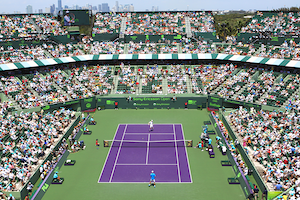 If tennis were her great love, this was a “Dear John Letter”. Justine Henin, the top female player, left fans and observers speechless with the statement that she has fallen out of love with professional competition and was calling it quits at the age of 25.
If tennis were her great love, this was a “Dear John Letter”. Justine Henin, the top female player, left fans and observers speechless with the statement that she has fallen out of love with professional competition and was calling it quits at the age of 25.
This striking decision comes on the heels of Henin’s best season ever, 10 of 14 tournaments won last year, including two majors. It leaves me pondering whether there is a furtive reason for this out of the blue departure.
In retrospect, we should expect the unexpected of Justine. An insular figure on the WTA tour, Henin has always marched to the beat of her own drummer. In the 2006 Australian Open final, Henin retired against Amelie Mauresmo, a few games from defeat citing a stomach ailment. The only woman to do so in the finals of a major in the open era, a blemish on Henin’s otherwise stellar career.
Henin’s results in 2008 have been mediocre at best . Some people may characterize Henin’s choice as radical, driven by fear of failure. Roger Federer, her male counterpart at number one, has similarly been going through a rough patch. Two weeks ago, after losing in the quarterfinals to Radek Stepanek, a player he previously owned, Federer was asked in his post match interview whether he thought this was “the beginning of the end”. Maybe, Henin’s decision stems from the fact that she feels ill equipped to deal with that kind of scrutiny. But, considering the upheavals that Henin has dealt with in her personal life since adolescence and the recent disintegration of her marriage, I doubt that the word “fear” is in her tennis vocabulary. Perhaps, this is a delayed response to residual marital baggage that Henin set aside last year which is now preventing her from fully focusing on her game.
Other than mononucleosis, Henin has evaded major physical ailments throughout her career. Of late though, she has been nursing a knee injury. Although this problem was not underlined as a reason for her exit, one wonders whether it is more severe than Henin let on. Injury leaves a player’s future in limbo and uncertainty can dampened anyone’s “passion and fire” to compete. As Justine herself said: “I am a perfectionist”. For some athletes, win or lose, satisfaction comes from just being out on the court; but that is not Henin. Knowing Justine’s dedication to being the best, it would go against her very nature to accept going from the peak to the valley of the sport. Tennis followers have witnessed the tumbling from the summit of Mauresmo since her appendectomy. A double major winner in 2006, Amelie has been unable to regain her “number one” form. The women’s game is so physically and mentally demanding that one must be in optimum shape to compete at the highest level. Thus, to this champion, retirement, the one factor she can control, may have felt like her sole option. Moreover, this choice may have seemed even more attractive by providing the chance to make history as the only woman to hang up her racket with the number one ranking.
Despite failing to win Wimbledon, Henin feels that all her objectives have been met. No doubt, a triumph at that venue would have elevated Henin to iconic status. Yet, in Justine’s eyes, that pursuit is insufficient an enticement to keep playing. Per Henin, no major can help her recapture the magic and ‘rekindle the flame’ that has pushed her to compete since she was five years old. To such an argument, there is no rebuttal. However, Henin may be confusing mental fatigue with a lost of passion. The former is curable with a holiday from weekly competition. But Henin has slammed the door on speculation that she may reconsider stating that her decision was firm, so it is “adieu” not “au revoir” to tennis.
Knowing when to bow out is the hardest thing. Unquestionably, some athletes have overstayed their welcome. With Henin’s current mind-set, her concern was that in “another six months to a year, tennis would leave a bitter taste in [her] mouth”. So perhaps, regardless of the disappointment her fans might feel, Henin should be commended on her bravery and not judged. In closing the curtain at this stage, she is very likely sparing them and herself, a lot of grief.
Undoubtedly, Henin will be missed by the game and her loyal followers. Peers, friend or foe, will remember her because victory is always a little sweeter against a worthy rival. In my opinion, no truer words were ever spoken than in the case of the Belgium, ‘the little dynamo with a dynamite game’.




